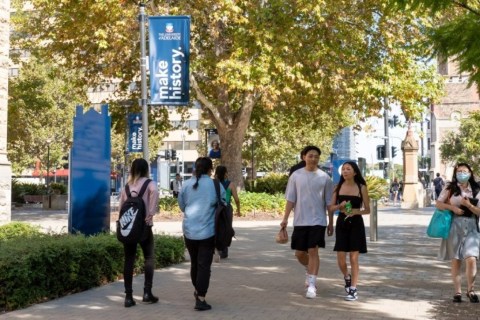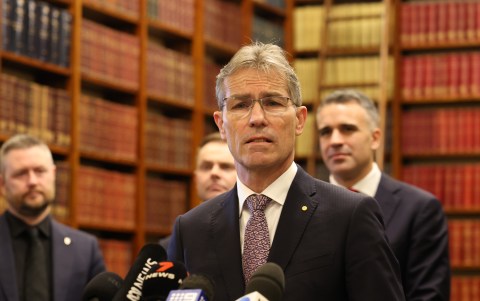Staff raise alarm over South Australian university merger workload
A senior University of Adelaide lecturer says the transition workload for the UniSA merger is “horrifically unsustainable” and planned changes to the academic calendar risk alienating current and future staff.

Dr Matthew Sorell, a senior lecturer at the University of Adelaide’s School of Electrical and Mechanical Engineering, wrote an email to more than 200 university engineering staff on January 26 outlining two “clear concerns” about the planned merger with the University of South Australia to form Adelaide University.
The email, seen by InDaily, was sent after a meeting held earlier in January where staff were updated about the design of the new university’s engineering curriculum.
The University of Adelaide and UniSA – as part of their plan to amalgamate with $464.5 million in state government support – have asked staff to co-design a “wholly new” curriculum with input from students and industry.
The merger transition plan outlines ambitions for the new curriculum to be the “highest quality curriculum in Australia” with most of it ready when Adelaide University opens in January 2026.
But Sorrell raised concerns as to whether that timeline was feasible due to workload demands on staff, which he argued would “not even remotely meet the spirit, let alone the letter” of the two universities’ enterprise bargaining agreements.
He also said the curriculum design process would hurt the universities’ research output.
“It is very clear that the transition will require extensive re-work of existing courses, which goes well beyond harmonisation,” Sorrell wrote.
“The work load data supplied to the meeting is, if I can be frank, horrifically unsustainable.
“Throwing graduate student resources at curriculum and course development is not a scalable solution.
“With the focus on curriculum redesign, all momentum in research actvity (sic) will be lost, contrary to the stated transition plan objectives for research and commercialisation.”
Sorrell, who has been at the University of Adelaide since 2002, also raised questions over plans to change the academic calendar at the new university.
The two universities have proposed moving to an academic trimester consisting of three 10-week semesters, rather than the current two semester model.
The transition plan states: “Following detailed analysis a 10-week trimester academic calendar is proposed as a preferred option for Adelaide University, subject to further review in the detailed design stages of transition.”
You might like
But Sorrell said staff workload issues would be “significantly compounded” by the new academic calendar, which he claimed would act as a “severe disincentive” for existing and prospective staff.
He said the change would leave the new university out of sync with local school holidays and the calendars of other universities, potentially disrupting student exchange programs and research collaboration.
“The misalignment of University and School holidays means that academics with young families will be disproportionately impacted, acting as a severe disincentive for young and early career academics, and disprortionately (sic) affecting young academic women,” he said.
“The misalignment with northern hemisphere seasons severely disrupts our ability for research collaboration, international student exchange and international study tours.”

He also argued that shorter turnaround times between semesters could disrupt research and “other university core business”.
“Re-engineering 12 week courses to 10 weeks is not as easy as it looks, and requires rearrangement of course content through complex core and pre-requisite pipelines,” he said.
Sorrell suggested the transition process should occur over six to eight years – rather than four – to “manage workload, course quality and student outcomes”.
He also said a two-semester calendar – with the potential for six- to eight-week intensive study terms during an elongated mid-semester break – would be a better academic calendar.
Sorrell declined to comment when contacted by InDaily.
In a response sent to all engineering staff, UniSA dean of programs (engineering and aviation), Professor Nikki Stanford, proposed sending an email outlining Sorrell’s concerns to the “Curriculum Leadership Group”.
“It is extremely important during this process that staff feel heard, and at the moment, I feel that colleagues want their concerns about workload and the trimester model to be addressed,” Stanford said, adding a major curriculum development document would be completed on February 9.
“If you will allow us some time to finalise these last milestones for the curriculum development, we will then have some space to spend some more time discussing your concerns and drafting a communication.
“We will do our best to help the engineering team be heard, and hopefully, get some kind of response from senior leadership about these concerns.”
InDaily asked the University of Adelaide what it was doing to ensure workload demands are sustainable for staff involved in curriculum design and whether a final decision has been made on academic trimesters.
In response, a University of Adelaide spokesperson said in a statement: “The academic calendar is yet to be finalised, and engagement with staff and students will be integral as we plan for the future.”
The spokesperson did not directly address the workload issues raised by staff but said “drawing on our deep collective expertise” to design the new university “enables us to provide a comprehensive curriculum at greater scale”.
“At this stage academic design teams, made up of discipline experts, are currently working to design the future curriculum for courses and programs in their disciplines,” the spokesperson said.
“Their work will then undergo a rigorous peer review and academic governance process before being finalised.”
Higher education union pushes for change
Stay informed, daily
National Tertiary Education Union (NTEU) SA division secretary Andrew Miller said the curriculum design workload and the proposed trimester model were “pivotal concerns” for staff.
“The issue around workload is real… we raised that late last year,” Miller said.
“On top of staff’s existing workloads, they’re having to go above and beyond to do a whole range of merger things – not just curriculum design.
“The impost on staff is enormous.”
The two universities undertook a “co-creation activity” in October and November to gauge staff, student and industry views on what they want from the new university.
According to a summary produced by the two universities, more than 2400 staff participated and the most viewed topic was the academic structure of the new university.
Miller claimed that during that there was “overwhelming disapproval from staff on the trimester proposal” during the co-creation process.
“A trimester model will involve staff having to do more and condense things and speed things up simultaneously, which is a little bit at odds with the widening participation agenda at the university,” Miller said.
“Because a sped-up model, whilst it might… be more student-friendly, will probably mean things happen at a far more rapid pace.
“Which will mean that things like student (assessment) extensions will have a backlog effect, which will be cumulative and compounding, and then the flow on ramifications for staff and workloads and assessment and everything else just doubles up continuously.”
The most popular idea generated in the co-creation exercise was a four-day workweek, according to the university’s summary.
‘Day zero’ draws closer for new university
The concerns around curriculum design come as the new Adelaide University approaches some key milestones in its development.
The first meeting of the newly formed transition council – the initial governing body of Adelaide University which will oversee key transition decisions, including the appointment of the inaugural vice-chancellor – will be on March 8.
University of Adelaide vice-chancellor Peter Høj said the first meeting will be “day zero” for the new Adelaide University and officially establish it as a new institution.
Speaking at the University of Adelaide’s annual meeting on Monday, Høj said the new university has now procured a curriculum management system from Melbourne-based software company Global IT Factory.
“It is something that greatly will facilitate not only the formation of a new curriculum but also anyone who is involved in designing, refining and delivering a top curriculum to our students,” Høj said.
“There are lots of people involved in this – we currently have 13 development groups working on… [program] concept designs.”

Høj said it was important that curriculum development took place in a “staged way” so the new university can get accreditation to offer courses for international students starting in the second half of 2024.
Adelaide University also has to establish an academic board and write its first strategic plan.
Høj said he hoped the first strategic plan would “not be too far away” and would give staff a more detailed insight into the merger plan.
“At that stage… I think we can present to our staff cohort and wider community a more granular view of how we travel forward in the formation of the new Adelaide University,” he said.
The transition council, led by UniSA chancellor Pauline Carr, is currently comprised of 13 members, with the two universities nominating six representatives each. Two positions are being held vacant for appointment at a future time.








